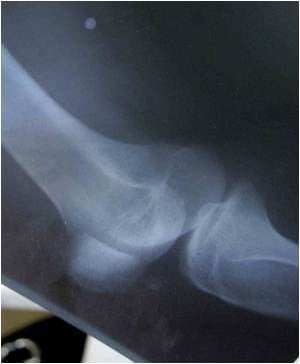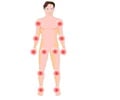New clinical guidelines for starting and monitoring treatments for children with juvenile idiopathic arthritis has been developed by the The American College of Rheumatology.

- Non-steroidal anti-inflammatory drugs (e.g. ibuprofen, naproxen, and many others)
- Intraarticular glucocorticoid injections (i.e. steroid joint injections)
- Non-biologic disease-modifying antirheumatic drugs: (e.g. methotrexate)
- Biologic disease-modifying antirheumatic drugs: (e.g. abatacept, anakinra and TNF-α inhibitors such as etanercept, adalimumab, infliximab)
- Systemic glucocorticoids: (e.g. prednisone)
It is estimated that one child in every 1,000 will develop a rheumatic disease. Nearly 300,000 American children suffer from juvenile idiopathic arthritis, which begins before patients reach the age of 16 and may involve chronic inflammation of one or many joints. JIA often persists into adulthood and can cause long-term co-existing conditions and disability. However, recent treatment advances have greatly improved short-and medium-term outcomes for these patients.
Recommendations Based on Sound ResearchThe research team led by Timothy Beukelman, MD, MSCE American College of Rheumatology member and assistant professor of pediatrics in the Division of Pediatric Rheumatology at the University of Alabama at Birmingham developed the guidelines using established processes from the RAND/UCLA Appropriateness Method. The method defines appropriate patient care by combining the best available scientific evidence with the collective judgment of experts.
The research team which included clinicians, researchers and a patient advocate with experience and expertise in JIA reviewed over 200 studies related to JIA treatment and evaluated more than 1,500 clinical scenarios that captured a broad range of medical decisions that are made in the care of JIA patients. The team explicitly considered when the benefits of using certain drugs outweigh any risks. Because JIA can affect each person differently, patients with similar disease characteristics were separated into five different JIA treatment groups to help streamline the recommendations.
"These recommendations were developed by two distinct panels of international pediatric rheumatology experts using a rigorous methodology," says Dr. Beukelman. "Our goal was to provide evidence and consensus-based guidance that reflects the current state of the field and is useful to clinicians of all levels of experience with the treatment of JIA. The recommendations are important because the treatment of JIA has undergone major changes over the last decade with the introduction of biologic therapeutic agents."
Advertisement
A brief summary of some of the most notable recommendations includes:
Advertisement
- Beginning treatment with TNF-α inhibitors in children with a history of arthritis in four or fewer joints and significant active arthritis despite treatment with methotrexate
- Beginning treatment with TNF-α inhibitors in children with a history of arthritis in five or more joints and any active arthritis following an adequate trial of methotrexate
- Beginning treatment with anakinra in children with systemic arthritis and active fever whose treatment requires a second medication in addition to systemic glucocorticoids
"We expect that knowledge of the safest and most effective treatments for JIA will continue to advance, and we suggest regularly updating these recommendations using newly published evidence," says Dr. Beukelman. "Ongoing research, both in the clinic and the laboratory, is critical to understanding how to best treat JIA and will help to continue to improve the quality of life for children with the disease."
Patients should talk to their rheumatologists to determine their best course of treatment.
Source-Eurekalert










